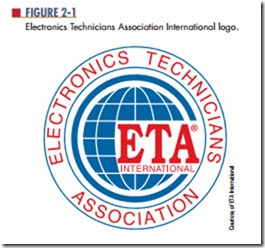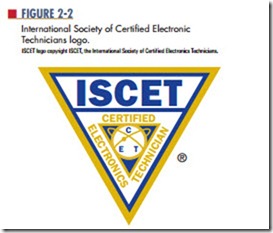An electronic technician can satisfy specific requirements by passing an exam and earning professional certification through certification agencies. Two such agencies are Electronics Technicians Association International (ETA-I) and Inter- national Society of Certified Electronics Technicians (ISCET). These agencies offer many certifications, including Associate Electronics Technician, Senior Certified Electronics Technician, and Master Certified Electronics Technician.
Certifications can also focus on a specific area of electronics, such as fiber optics, computer software, or residential electronics.
Graduates of a diploma program may also decide to continue their education toward a Bachelor of Science in Electronic Engineering Technology or a related degree.
This chapter looks at the basics of certification re- quired for electronics technicians.
Basis for Certification
The electronics technicians association in- ternational (eta-i) (Figure 2-1), a not-for-profit professional organization, was founded in 1978 by electronics technicians. These technicians had a need for meeting as a group that was independent of in- dustry. The purpose of the group was to promote recognized professional credentials as proof of a tech- nician’s skills and knowledge in the field of electron- ics. ETA now offers over 50 certifications, and all
these are accredited by the international Certifica- tion accreditation Council (iCaC) and align with the ISO-17024 standards. The ICAC is an alliance of organizations dedicated to assuring competency, professional management, and service to the public through encouraging and setting standards for certification and licensing programs internationally.
The international society of Certified electronics technicians (isCet) (Figure 2-2) trains, prepares, and tests technicians in the electronics and appliance service industry. The Certified electronics technician (Cet) Program, founded in 1965, mea- sures the degree of knowledge and technical skills of working electronics technicians. This voluntary certifi- cation enables employers to separate knowledgeable job applicants from those with less training and fewer skills.
The CET program protects consumers by certify- ing, in the absence of governmental licensing, that the technician repairing their products has the knowledge, skills, and experience to do the job. The CET program has increased acceptance by technicians and employers as well as the public. Many employers encourage and some even require their technicians to be certified.
Electronics technicians who have passed any of the ISCET CET exams are encouraged to apply for membership in ISCET.
Anybody who has the knowledge and interest in electronics has the opportunity to become certified. There are more than 70 certification programs, including both stand-alone certifications and career track certifications for those interested in mastering their chosen field. The certification exams test individual proficiencies rather than product or vendor knowl- edge. The exams meet or exceed industry standards.
A panel of experts, comprised of educators and practitioners from each discipline, reviews each exam regularly to ensure that it meets professional and in- dustry standards.
Certification can be a ticket to a better career, as it represents the difference between someone who claims to be a technician and someone who really is a technician.
Many government and private organizations re- quire certification as a qualification for their positions, so passing one or more of the exams generally makes a technician more employable.
Questions
1. List the organizations responsible for certification of electronics technicians.
2. What organization accredits the certification of electronics technicians?
3. What is the purpose of getting a certification in electronics?
4. What do the certification exams test for?
5. What is the value of getting certified as an electronics technician?

